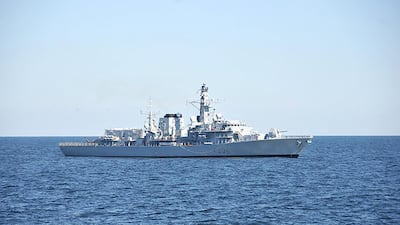Britain has joined a US-led maritime mission to protect merchant vessels in the Strait of Hormuz amid regional tension with Iran, which has seized and harassed oil tankers in the Arabian Gulf.
The government said the UK would be heading the operation and had offered to lead one of the mission’s maritime task groups.
“The UK is determined to ensure her shipping is protected from unlawful threats and for that reason we have today joined the new maritime security mission in the Gulf,” Defence Secretary Ben Wallace said.
“Upholding international maritime law and freedom of passage is in all our interests. We are seeing, across our seas and oceans, too many incidents that seek to challenge such freedoms.
"The UK is proud to be partnering with other members of the international community to uphold the rules-based approach."
Britain has sent a destroyer, HMS Duncan, and a frigate, HMS Montrose, to the Gulf to accompany UK-flagged vessels through the strait.
So far, naval ships have escorted 47 vessels, British officials said.
Operation Sentinel will use ships already in the region. The UK decision came after an international conference in Bahrain last week.
"The decision is a reflection of the fact that the US has by far the most capable forces in the region to lead a maritime security coalition, particularly in terms of surveillance and reconnaissance," said Nick Childs, senior fellow at the International Institute for Strategic Studies.
"And both the UK and US probably see a greater urgency in the situation than other potential contributors.
"But the UK call for a European-led response was always likely to come up against the reality that European navies would not be able to respond quickly, on top of which there will have been some political hesitation in some capitals."
Tehran breached the enriched uranium limit agreed to with world powers in a 2015 deal to limit its nuclear programme.
The US has since pulled out of the agreement and reimposed sanctions on Iran.
Foreign Secretary Dominic Raab said the UK's approach to Iran had not changed, and that it advocated maintaining the 2015 nuclear deal and defusing the situation.
“It is vital to secure the freedom for all international shipping to navigate the Strait of Hormuz without delay, given the increased threat," Mr Raab said.
"This deployment will reinforce security and provide reassurance for shipping. Our aim is to build the broadest international support to uphold freedom of navigation in the region, as protected under international law."
He said he had spoken to global partners to encourage them to join in but it appeared none had.
Last month, Iranian forces seized a British tanker, Stena Impero, near the Strait of Hormuz, claiming it was breaking maritime law.
That came two weeks after Britain seized an Iranian oil tanker near Gibraltar, accusing it of breaching sanctions on Syria.
"Events in the Gulf over the last four months, including attacks on four tankers off the coast of the UAE and the illegal seizure of the British-flagged oil tanker Stena Impero, have seen the threat to commercial shipping rise," the British Defence Ministry said.
William King, who commands the Montrose, said Iran was trying to test the UK.
Iranian Foreign Minister Javad Zarif said Iran was ready to act more vigorously to protect its interests as he slammed the UK for being complicit in the White House's "economic terrorism".

